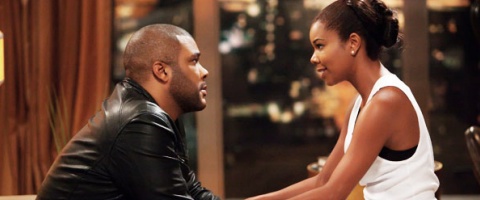Tyler Perry’s Good Deeds is not the a-ha moment I was hoping it would be. It’s not the Academy Award-winning screenplay I’m convinced is somewhere inside the director’s brain, and it’s not the impetus most people need to fundamentally reevaluate their outlook on his work. The film is riddled with too many missteps to accomplish that, but even given all its shortcomings, it’s the best movie we’ve seen from Tyler Perry. More importantly, it’s the first one that’s been exclusively populated by characters, as opposed to caricatures.
There’s no Madeas. In fact, every person we’re introduced to feels nuanced and complicated. That might not be a stretch for most screenplays, but here, we’re given a sharp juxtaposition between the country clubs and the bread lines. Considering current political circumstances, it would have been easy for Perry to create polarized contrasts, but more often than not, he chooses to humanize rather than stereotype. He shows rather than preaches, which is perhaps why Good Deeds feels a lot less like a moral commentary than what we’ve been given. When the film allows itself to relax and breathe, it’s very affecting. Unfortunately it doesn’t do that enough-- there’s just no time thanks to an overabundance of plot.
Our main character Wesley Deeds (Perry) never wanted to be the CEO. That title was handed to him thanks to his brother’s (Brian J White) impulsive nature and his father’s early death. As a result, he spends his nights working late and avoiding the upper crust fiancé (Gabrielle Union) he’s only vaguely compatible with. A few feet away, yet thousands of decisions apart, our second lead is Wesley’s night janitor Lindsey (Thandie Newton), spending her evenings hiding her daughter in a broom closet and trying to avoid social services. In debt to the IRS and lacking a place to stay, she’s low on hope and absent options, at least until she parks in the CEO’s spot.
That chance encounter leads to a strange friendship. Wesley and Lindsey don’t find understanding with each other as much as a perspective each has been lacking. Because they’re not weighed down by social codes or fears of rejection, they’re free to be honest. They’re free to call bullshit on things as trivial as Tupac and as serious as child abuse. These frank conversations, sometimes quiet and sometimes heated, are what make Good Deeds worth seeing, but ultimately, there’s just not enough of them. Eventually, life gets in the way. There are problems at the company, problems figuring out where to stay, and problems with family members.
The litany of issues coupled with some heavy-handed music choices let the film devolve into melodrama and obscure the good will created through the subtler exchanges. I get what Perry was trying to do. By adding richness to Wesley and Lindsey’s lives, he wanted to provide more basis for their personalities. To an extent, it works. Some of these knockdown drag out fights are riveting, but they also lead to an and-then-this-happened pace. Sometimes less is more, and sometimes a good scene needs to be cut.
Good Deeds is an imperfect step forward. It’s a pretty good film that continues the forward progress made by Why Did I Get Married Too?. At this rate, we should be three or four away from something special, at least if you don’t count the Madea movies.
Mack Rawden is the Editor-In-Chief of CinemaBlend. He first started working at the publication as a writer back in 2007 and has held various jobs at the site in the time since including Managing Editor, Pop Culture Editor and Staff Writer. He now splits his time between working on CinemaBlend’s user experience, helping to plan the site’s editorial direction and writing passionate articles about niche entertainment topics he’s into. He graduated from Indiana University with a degree in English (go Hoosiers!) and has been interviewed and quoted in a variety of publications including Digiday. Enthusiastic about Clue, case-of-the-week mysteries, a great wrestling promo and cookies at Disney World. Less enthusiastic about the pricing structure of cable, loud noises and Tuesdays.











